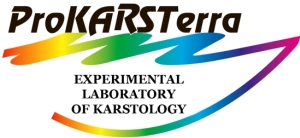
The laboratory is multifunctional, which results from the interdisciplinary character of Karstology and from the methodological necessity to be the basis for the development of system analysis of karst geosystems. This requires joint work of specialists both Bulgarian and foreign ones from different scientific fields. It has important significance, in many cases of leading importance for the development of complex expertise for karst territories and sites. Thus, the Laboratory to some degree compensates for the lack of a Bulgarian Institute of Karstology, and despite its still limited institutional capacity and resources, it develops a rich range of methodologies, models, ideas and initiatives.
The main priority of the Laboratory's activity is the monitoring of modern karst genesis, which includes the following:- Specialized methodological studies for system analysis and integrated monitoring of karst geosystems with appropriate experimentation, verification, further elaboration, approbation, validation, adaptation;
- Selection, addition, calibration, upgrading and maintenance of professional research and monitoring equipment;
- Design and installation of original equipment for specialized studies, experiments and tests in field and stationary conditions;
- Designing, organizing, constructing and maintaining of experimental monitoring of karst - on its individual elements, or in integrated monitoring networks;
- Organization and implementation of specialized socio-economic monitoring (SEM) in karst areas - development of models for collection and organization of information, conducting of specialized surveys and processing and analysis of databases;
- Processing and analysis of samples taken in field research and monitoring;
- Harmonization of standards and regulations for karst monitoring with those in the EU and their experimental development on the basis of world best practices and the specificity of karst geosystems;
- Based on the results from monitoring, offering expert and consultancy assistance on various problems arising from the management and conservation of karst territories.
- Develops and experiments methods for systemic studies of karst geosystems;
- Organizes and conducts, incl. in collaboration with other specialists, field studies and regime observations;
- Designs, prepares and conducts various experiments both field and laboratory ones;
- Organizes and conducts revision studies in different karst territories in order to update the information;
- Creates, processes, stores and manages databases of original and revision studies and laboratory analyzes;
- Organizes a specialized karst cadaster (for model areas as an initial stage);
- In methodological and organizational terms prepare the development of a new map and new zoning and typology of karst in Bulgaria;
- Organizes workshops-discussions and prepares scientifically-founded legislative initiatives for the rational use of karst territories and sites;
- Exploring, testing and introducing foreign research experience and good practices for optimal use in karst areas;
- Prepares, coordinates and implements research, practical and educational projects with a karst theme;
- Establishes and maintains contacts with institutions and businesses, preparing expert opinions for the rational and environmentally sound use of karst resources;
- Develops the original educational strategy "ProKARSTerra-Edu" and experiments with its international initiatives;
- Attracts and teaches PhD students, University students and pupils, as well as representatives of various institutions whose activities and responsibilities concern karst;
- Organizes and conducts international scientific-applied forums, seminars, workshops and lectures with karst themes;
- Develops and maintains the international network "ProKARSTerra";
- Promotes karst and caves of Bulgaria.
* * *
To conduct fieldwork and maintenance of the monitoring, the team of the Laboratory carried out a large number of field works (141), including with foreign researchers. Ph.D. students, trained at the Laboratory and post-graduate students, participated in 62 field surveys. Within the framework of international co-operation, 41 trips abroad were held in 9 countries (Czech Republic, Poland, Slovakia, Belgium, Japan, Albania, Greece, Macedonia, Germany).
The research work carried out by the Laboratory over the last 10 years has been supported by 16 successful projects, 3 of which funded by UNESCO and 9 in international cooperation, incl. 6 on bilateral inter-academic cooperation with the Czech Academy of Sciences.
The results of the research and the educational activities of ELK are reported at authoritative scientific forums in Bulgaria and abroad or in articles in scientific journals (over 70 publications in Bulgarian, English, Czech, Russian and Polish). They cover the thematic aspects of Karstology developed in the Laboratory's research program.
The Laboratory is the initiated and organized 4 international scientific and practical karst forums (2005, 2012, 2015, 2019. Representatives of the Laboratory have participated in the work of a number of other scientific conferences and congresses in Bulgaria and around the world.
Within the framework of its active international co-operation, the Laboratory hosted a total of 135 foreign guests from 25 institutions and organizations from 15 countries (Poland, Slovakia, Czech Republic, China, Albania, Japan, Croatia, Greece, South Africa, Georgia, Tatarstan-Russian Federation, Latvia, Lithuania, Germany, and Montenegro).
